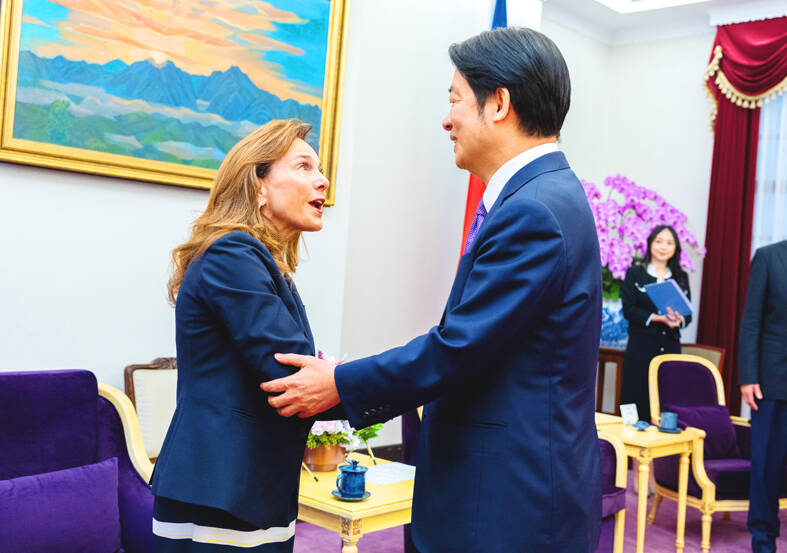Visiting US representatives yesterday reiterated staunch US support for Taiwan, and pledged to continue strengthening security, economic and social relationships with the nation.
“By standing with Taiwan we send a clear message to Beijing and to the world. The United States will not waver in our commitment to defend freedom and uphold the principles of democracy,” US Representative Lisa McClain told a news conference in Taipei.
The bipartisan delegation’s visit was to look for ways that “we can strengthen this already strong relationship, as well as the bonds between the American and Taiwanese people,” US Representative Dan Kildee said.

Photo: CNA
“Let no one doubt our support for ... Taiwan, for your people and our bright future together,” US Representative Mark Alford said.
The three lawmakers commended the resilience of Taiwanese in the face of constant threats from an authoritarian neighbor.
The US Congress is strengthening Washington’s security and economic ties with Taipei with concrete actions, such as the US House of Representatives last week approving a foreign aid package with US$8 billion for Taiwan and the Indo-Pacific region, Kildee said.
The US Senate was due to vote yesterday on US$95 billion in aid to Taiwan, Ukraine and Israel.
“When it comes to the need that Taiwan has to defend itself against any aggression, the United States will be there,” Kildee said.
Asked about US Secretary of State Antony Blinken’s visit to Beijing today, McClain said that she hoped Blinken would underline the importance of peace.
“China’s not our friend economically, educationally and militarily,” she said, adding that the US should “stand strong as a leader” for itself, and for the free world and democracy.
Kildee also urged Blinken to voice concerns over China’s provocative actions in the Indo-Pacific region, threats to freedom of navigation, unfair trade and economic practices, and violations of human rights.
Earlier yesterday, the delegation met with president-elect William Lai (賴清德), who vowed to build on the efforts of President Tsai Ing-wen (蔡英文) and continue bolstering the relationship between Taiwan and the US.
The vice president pledged to safeguard peace and stability across the Taiwan Strait after taking office on May 20, adding that he is looking forward to deeper cooperation with like-minded nations such as the US.
This year marks the 45th anniversary of the Taiwan Relations Act, which lays a solid foundation for the relations between Taiwan and the US, and serves as an important cornerstone of peace across the Taiwan Strait and stability in the Indo-Pacific region, Lai said during a meeting with the delegation.
Over the past 45 years, the US Congress has always been steadfast in its support for Taiwan by passing Taiwan-friendly legislation to help strengthen the nation’s self-defense capabilities and deepen bilateral cooperation, he said.
The foreign aid package passed by the US House would bolster deterrence against authoritarian expansion and help enhance the confidence of Indo-Pacific nations in the US’ role in safeguarding regional democracy, he said.
The economic and trade relationship between the two sides has also been growing, which is not only beneficial to people and businesses in Taiwan and the US, but could help bolster economic resilience, he said.
McClain underlined the importance of bolstering ties between the US and Taiwan as it would also promote peace around the world.
The US cherishes its relationship with Taiwan, including military cooperation and economic exchanges, she said.
As a member of the US House Ways and Means Committee, Kildee said that he was glad to see the development of the economic and trade relationship between Taipei and Washington, adding that he hopes a second agreement under the US-Taiwan Initiative on 21st-Century Trade would be finalized soon.
The delegation is to meet with Tsai today and conclude the visit tomorrow.

The combined effect of the monsoon, the outer rim of Typhoon Fengshen and a low-pressure system is expected to bring significant rainfall this week to various parts of the nation, the Central Weather Administration (CWA) said. The heaviest rain is expected to occur today and tomorrow, with torrential rain expected in Keelung’s north coast, Yilan and the mountainous regions of Taipei and New Taipei City, the CWA said. Rivers could rise rapidly, and residents should stay away from riverbanks and avoid going to the mountains or engaging in water activities, it said. Scattered showers are expected today in central and

COOPERATION: Taiwan is aligning closely with US strategic objectives on various matters, including China’s rare earths restrictions, the Ministry of Foreign Affairs said Taiwan could deal with China’s tightened export controls on rare earth metals by turning to “urban mining,” a researcher said yesterday. Rare earth metals, which are used in semiconductors and other electronic components, could be recovered from industrial or electronic waste to reduce reliance on imports, National Cheng Kung University Department of Resources Engineering professor Lee Cheng-han (李政翰) said. Despite their name, rare earth elements are not actually rare — their abundance in the Earth’s crust is relatively high, but they are dispersed, making extraction and refining energy-intensive and environmentally damaging, he said, adding that many countries have opted to

SUPPLY CHAIN: Taiwan’s advantages in the drone industry include rapid production capacity that is independent of Chinese-made parts, the economic ministry said The Executive Yuan yesterday approved plans to invest NT$44.2 billion (US$1.44 billion) into domestic production of uncrewed aerial vehicles over the next six years, bringing Taiwan’s output value to more than NT$40 billion by 2030 and making the nation Asia’s democratic hub for the drone supply chain. The proposed budget has NT$33.8 billion in new allocations and NT$10.43 billion in existing funds, the Ministry of Economic Affairs said. Under the new development program, the public sector would purchase nearly 100,000 drones, of which 50,898 would be for civil and government use, while 48,750 would be for national defense, it said. The Ministry of

UNITED: The other candidates congratulated Cheng on her win, saying they hoped the new chair could bring the party to victory in the elections next year and in 2028 Former Chinese Nationalist Party (KMT) lawmaker Cheng Li-wun (鄭麗文) yesterday won the party’s chair election with 65,122 votes, or 50.15 percent of the votes. It was the first time Cheng, 55, ran for the top KMT post, and she is the second woman to hold the post of chair, following Hung Hsiu-chu (洪秀柱), who served from 2016 to 2017. Cheng is to succeed incumbent Eric Chu (朱立倫) on Nov. 1 for a four-year term. Cheng said she has spoken with the other five candidates and pledged to maintain party unity, adding that the party would aim to win the elections next year and